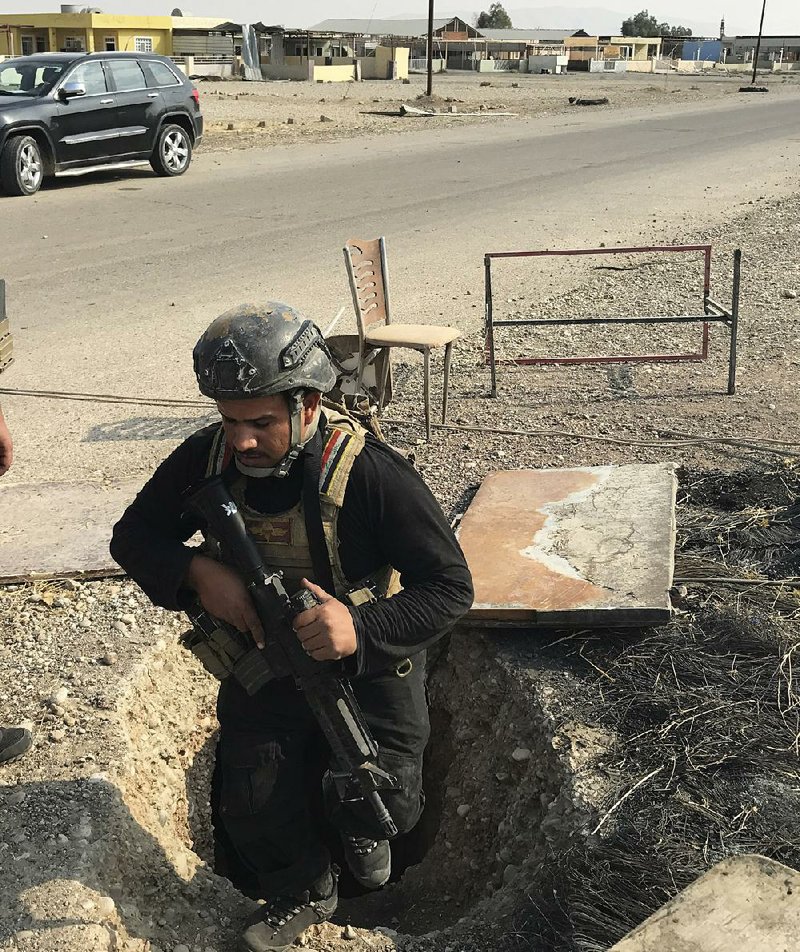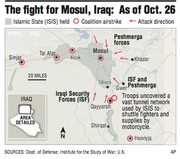KHAZER, Iraq -- Iraqi forces explored a network of tunnels and uncovered a bomb-making facility Thursday in a village near Mosul that was recently retaken from the Islamic State extremist group, offering a glimpse of the challenge they will face as they move closer to the city.
Ten days into the offensive, the special forces are still at least 4 miles east of the city and have faced stiff resistance, with the Islamic State firing mortars and machine guns and sending armored suicide truck bombs trundling across the arid plains.
Once inside the small, sparsely populated villages that ring Mosul, Iraqi forces must contend with explosive booby traps and hidden snipers. The fortifications are expected to get even more daunting once the forces enter the city.
The extremists captured Mosul in a matter of days in 2014 and have had more than two years to build up defenses and brutally root out any internal opposition. The operation to retake the northern city is expected to take weeks, if not months.
Iraqi forces approaching Mosul from the south, meanwhile, are still 20 miles from the city, and the special forces to the east said they will not push ahead until the other forces are able to tighten the noose.
Iraqi army Maj. Gen. Najim al-Jabori said forces south of Mosul retook the town of Staff al-Tut in the Tigris River valley Wednesday and that local tribal and militia forces have been deployed to protect the gains while his troops regroup for their next advance.
Special forces Brig. Gen. Haider Fadhil insisted that actions are on track. "The operation has not been stopped and is proceeding as planned," he said.
During cleanup operations in the area of Tob Zawa, his men found a tire shop that had been converted into a factory for making roadside bombs and attaching armor to vehicles.
They also found a tunnel equipped with fans and lights that ran from beneath a mosque out to a road. Iraqi forces have found in areas retaken from the Islamic State extensive tunneling networks that the militants used to elude U.S.-led coalition warplanes.
Many fear that the Islamic State will resort to more brutal tactics as the forces converge on the city, which is still home to more than 1 million people.
Compounding fears are continued reports, from Iraqi military officers and people who escaped the Islamic State, of the militants rounding up villagers at gunpoint to use as human shields as they retreat toward Mosul.
At least seven villages south of Mosul were nearly emptied by the militants as they advanced last week, the military officials said.
Villagers also described mass executions of former policemen and army officers as the militants became increasingly paranoid about spies and collaborators.
When Iraqi security forces retook the village of Tulul al-Nasir last week, soldiers found that most of the homes were empty. Residents of the gray, cinder-block settlement about 40 miles south of Mosul had been ordered by the militants to walk about 15 miles north to Hamam al-Ali, a larger village that the militants still control.
"They told us on the loudspeakers that whoever stays will be killed," said Mohammed Ali, 45.
More than 90 percent of the village of about 5,000 people was kidnapped, according to Iraqi army officer Col. Faisal Ali Abdellatif.
"When they retreat from every village, they take the civilians with them to use as human shields," he said.
Abdulrahim al-Shammiri, the chairman of the human-rights committee in the Iraqi parliament, said 190 civilians had been executed in Hamam al-Ali on Wednesday after being "kidnapped" from surrounding areas.
Those who escaped said that former police or army officers were separated from their families and executed.
The U.N.'s public health agency says it has trained 90 Iraqi medics in "mass casualty management," with a special focus on chemical attacks. The extremist group is believed to have crude chemical weapons capabilities, and Iraqi forces say they are prepared to encounter them on the battlefield.
The World Health Organization said that of the 700,000 people expected to flee Mosul, some 200,000 will require emergency health services, including more than 90,000 children needing vaccinations and 8,000 pregnant women.
The International Organization for Migration says about 9,000 people have fled so far. It's a relatively small number, but until now, the battles have taken place in small farming communities that were mostly abandoned.
The United Nations' refugee agency is shipping tents, blankets and other aid from the United Arab Emirates to northern Iraq to help those affected by the military campaign. Soliman Mohamed Daud, a senior U.N. High Commissioner for Refugees supply officer, said 7,000 units of the relief aid will be sent to northern Iraq starting Thursday.
The Mosul offensive is the largest Iraqi military operation since the 2003 U.S.-led invasion, and involves more than 25,000 Iraqi soldiers, federal police, Kurdish forces, Sunni tribal fighters and state-sanctioned Shiite militias.
Information for this article was contributed by Qassim Abdul-Zahra, Joseph Krauss, Sinan Salaheddin, Susannah George and Jon Gambrell of The Associated Press; and by Loveday Morris and Mustafa Salim of The Washington Post.
A Section on 10/28/2016


